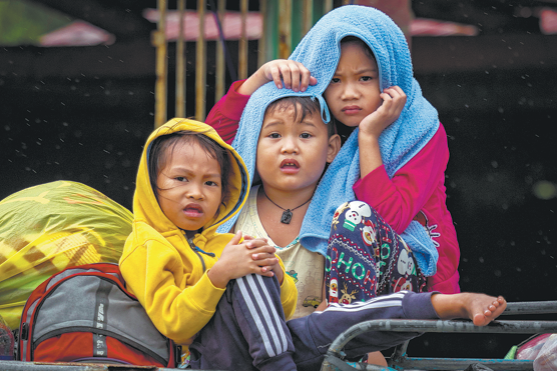Farm laborers reap misery as virus does its dirty work


A growing number of agricultural workers in the United States have become sick from coronavirus in rural communities and states where infections are growing, sparking fears the outbreak could get worse during the summer harvest.
The virus infected agricultural workers in Florida in mid-June just as many began to migrate north for work, away from the Sunshine State, which has seen a record-breaking surge in COVID-19 cases.
In the farming communities of Immokalee Lake and Lake Worth there were 1,207 and 1,418 confirmed cases respectively, and in the towns of Indiantown and St Petersburg there were 534 and 514 confirmed cases respectively.
Angelina Vasquez, 52, a single mother of two, lives in Immokalee close to many other farmworkers. And she is preparing to travel north with her daughters to New Jersey to pick blueberries. But she is aware that she will be unable to practice social distancing because she will be transported in a van packed with other workers.
"We're afraid," she told The New York Times. "But where am I supposed to go? There is no work here."
Despite many counties in south Florida mandating that people wear face masks in public, Florida's Republican Governor Ron DeSantis has refused to issue a statewide order for people to wear masks. Miami-Dade Mayor Carlos Gimenez announced on Wednesday, that teams will go to COVID-19 hot spots such as Little Havana and Homestead, an agricultural area with vegetable farms and nurseries.
The teams will hand out masks and hand sanitizers after Gimenez said doctors had noticed a surge in cases among farmworkers. They will also offer them hotel rooms if they live in small houses where they could infect others.
The Centers for Disease Control and Prevention, or CDC, notes on its website that farmworkers face a particular risk of infection from being in close contact with one another in fields, in shared housing or transport, and because of limited access to clean water for hygiene.
Significant challenges
The CDC and the Occupational Safety and Health Administration issued joint guidelines this month to keep farmworkers safe, but noted that the industry posed significant challenges.
"Agriculture work sites, shared worker housing, and shared worker transportation vehicles present unique challenges for preventing and controlling the spread of COVID-19," the guidelines said.
In recent weeks, Tennessee, Oregon, Washington, North Carolina, Colorado, Michigan, Florida, New Jersey and New York have reported coronavirus outbreaks infecting dozens to hundreds of workers on farms and fruit and vegetable processing facilities.
When more than 600 fruit-packing workers in Yakima Valley in Washington state got sick from the coronavirus last month, it led many to demand more personal protective equipment. Factories and Governor Jay Inslee later agreed to issue it.
In New Jersey, at least 100 workers at two produce plants came down with COVID-19 last month, and eight workers got sick in Guilford County, North Carolina, forcing a strawberry field to close.
A group of about 50 farmworkers went on strike on Thursday at a pistachio farm in central California, demanding free face coverings, gloves and information from the farm's owner after they said they learned from the media that dozens of their co-workers tested positive for the novel coronavirus, a union official said.
The recent outbreak among fruit and crop pickers echoes what happened in the meatpacking industry, in which more than 12,000 workers fell ill and at least 93 died, according to the United Food and Commercial Workers International Union.
Last month, the US Agriculture Department and Food and Drug Administration said the government could use the Defense Production Act to keep fruit and vegetable lines active and "protect the food supply and prevent significant food shortages".
































